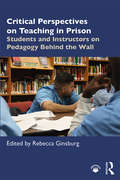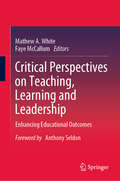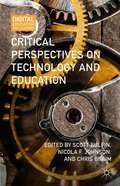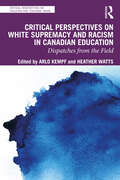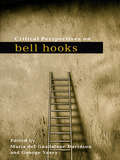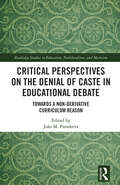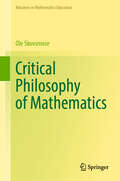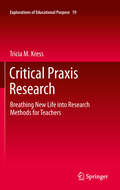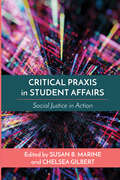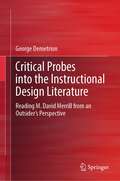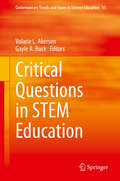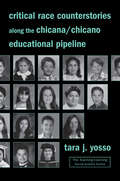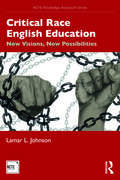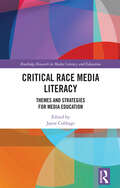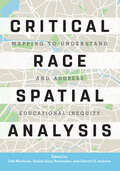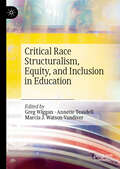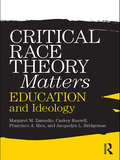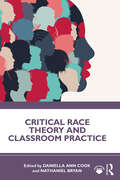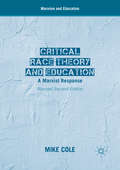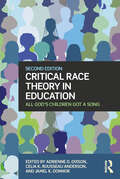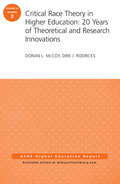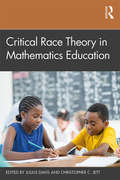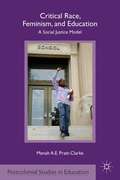- Table View
- List View
Critical Perspectives on Teaching in Prison: Students and Instructors on Pedagogy Behind the Wall
by Rebecca GinsburgThis volume makes a case for engaging critical approaches for teaching adults in prison higher education (or “college-in-prison”) programs. This book not only contextualizes pedagogy within the specialized and growing niche of prison instruction, but also addresses prison abolition, reentry, and educational equity. Chapters are written by prison instructors, currently incarcerated students, and formerly incarcerated students, providing a variety of perspectives on the many roadblocks and ambitions of teaching and learning in carceral settings. All unapologetic advocates of increasing access to higher education for people in prison, contributors discuss the high stakes of teaching incarcerated individuals and address the dynamics, conditions, and challenges of doing such work. The type of instruction that contributors advocate is transferable beyond prisons to traditional campus settings. Hence, the lessons of this volume will not only support readers in becoming more thoughtful prison educators and program administrators, but also in becoming better teachers who can employ critical, democratic pedagogy in a range of contexts.
Critical Perspectives on Teaching, Learning and Leadership: Enhancing Educational Outcomes
by Mathew A. White Faye McCallumThis book addresses the significant problems that can arise for pre-service teachers, teachers and school leaders who are unprepared for the complexities of 21st century teaching. It focuses on major factors impacting teacher preparation during an era of significant change, including student learning, academic growth, classroom practice, and the efficacy of teachers. In turn, the book considers crucial aspects that can enhance educational outcomes and investigates questions including what impact the changing nature of teachers’ work has on teacher preparation; how educators can evaluate blended learning; and what impact teachers have on learners. This book provides evidence-based approaches that can be used to achieve a positive impact on education and narrow the gap in contemporary and emerging global topics in education.
Critical Perspectives on Technology and Education
by Chris Bigum Scott Bulfin Nicola F. JohnsonThis book offers critical readings of issues in education and technology and demonstrates how researchers can use critical perspectives from sociology, digital media, cultural studies, and other fields to broaden the "ed-tech" research imagination, open up new topics, ask new questions, develop theory, and articulate an agenda for informed action.
Critical Perspectives on White Supremacy and Racism in Canadian Education: Dispatches from the Field (Critical Perspectives on Teaching and Teachers’ Work)
by Arlo Kempf Heather WattsCritical Perspectives on White Supremacy and Racism in Canadian Education shows how K-12 schooling continues to produce and maintain white supremacist and colonial logics and questions the alternate future of schooling in Canada.It argues that white supremacy and race in schooling are present in colonial-centered approaches to teacher education, formal and informal exclusion through curriculum development, and persistent failed commitments to racial justice and decolonization. These themes guide the organization of this collection, which is further underpinned by theoretical perspectives, including critical race theory, anti-Blackness theory, abolition, and anticolonial theory. Contributions are drawn from classroom teachers, community educators, and pre-service teacher educators and are powerfully informed by first-hand accounts as well as stories of teachers and teacher candidates.Combining theory with practice, this edited volume will be important reading for advanced undergraduate and postgraduate students in social justice education, multicultural education, and Indigenous studies. It will also be beneficial reading for antiracist and Indigenous education researchers, as well as policymakers and practitioners within critical education.
Critical Perspectives on bell hooks (Critical Social Thought)
by George Yancy Maria del Guadalupe DavidsonAlthough bell hooks has long challenged the dominant paradigms of race, class, and gender, there has never been a comprehensive book critically reflecting upon this seminal scholar’s body of work. Her written works aim to transgress and disrupt those codes that exclude others as intellectually mediocre, and hooks’ challenge to various hegemonic practices has heavily influenced scholars in numerous areas of inquiry. This important resource thematically examines hooks’ works across various disciplinary divides, including her critique on educational theory and practice, theorization of racial construction, dynamics of gender, and spirituality and love as correctives in postmodern life. Ultimately, this book offers a fresh perspective for scholars and students wanting to engage in the prominent work of bell hooks, and makes available to its readers the full significance of her work. Compelling and unprecedented, Critical Perspectives on bell hooks is a must-read for scholars, professors, and students interested in issues of race, class, and gender.
Critical Perspectives on the Denial of Caste in Educational Debate: Towards a Non-derivative Curriculum Reason (Routledge Studies in Education, Neoliberalism, and Marxism)
by João M. ParaskevaThis volume represents the first exploration of caste in the field of curriculum studies, challenging the ongoing silence around the issue of caste in education and curriculum theory. Presenting comprehensive critical examination of caste as a category of domination and oppression in the colonial power matrix, chapters confront Eurocentric educational epistemologies which deny the existence and influence of caste. The book examines the impact of such silence in educational policy, praxis, and curriculum, and draws from leading scholars to illustrate the fluidity of power and oppression in the caste system. By challenging historical, cultural, and institutional origins of caste and foregrounding perspectives from outside Western epistemological frameworks, the book pioneers a critical approach to integrating caste in educational debate to interrupt social and cognitive injustices. In so doing so, the volume advocates for an alternative, non-derivative curriculum reason, through an itinerant curriculum theory as a path toward the emergence of a critical Dalit educational theory. As such, it makes a vital contribution for scholars and researchers looking to refine and enhance their knowledge of curriculum studies by highlighting the importance of theorizing caste in the role of education.
Critical Philosophy of Mathematics (Advances in Mathematics Education #15)
by Ole SkovsmoseThis book provides a philosophy of mathematics that resonates with critical mathematics education. It draws attention to the social complexities that characterise the period of Modernity including the extreme exploitation of manual workers and their families, brutal forms of colonisations, trading of slaves, and the formation of racist ideologies. It portrays Modernity as a period of contradictions and highlights that mathematics is a part of these contradictions. The text interprets mathematics as being indefinite, seeing that mathematics is a part of the ongoing human constructions. It outlines a performative interpretation of mathematics, portraying mathematics as intrinsically connected to actions. Any kind of action, including mathematics-based actions, calls for ethical considerations and this leads to any mathematical practice, either in research, application, or education, to face ethical challenges. It illustrates with examples how a critical philosophy of mathematics can come to be an integral part of classroom practices.
Critical Praxis Research: Breathing New Life into Research Methods for Teachers (Explorations of Educational Purpose #19)
by Tricia M. KressCritical Praxis Research (CPR) is a teacher research methodology designed to bridge the divide between practitioner and scholar, drawing together many strands to explain the research process not just as something teacher researchers do, but as a fundamental part of who teacher researchers are. Emphasizing the researcher over the method, CPR embraces and amplifies the skills and passions teachers naturally bring to their research endeavours. Emerging from the tradition of critical pedagogy, Critical Praxis Research: Breathing New Life into Research Methods for Teachers transcends longstanding debates over quantitative vs. qualitative and scholar vs. practitioner research. The text examines the histories and current applications of common methodologies and re-conceptualizes the ways that these methodologies can be used to enhance teachers' identities as practitioners and researchers. It also provides a critical examination of the role of Institutional Review Boards, and explores the complexity and ethics of data collection, data analysis, and writing. Through guiding questions and writing prompts, the author encourages readers to think through the process of design and conducting CPR. The text is theoretically rich, but written in an accessible style infused with metaphor, irony, and humour. Critical Praxis Research: Breathing New Life into Research Methods for Teachers is both instructive and uplifting, sending the message that research is difficult but also joyful, like life itself.
Critical Praxis in Student Affairs: Social Justice in Action
by Susan B. MarineStudent affairs work—like higher education—is fundamentally about change. Principally, the change work performed by student affairs practitioners is about supporting the growth and development of individual students and student groups. Increasingly, that work has called for practitioners to become more active in working to change higher education so that it lives up to its radically democratic, inclusive ideals. This means adopting new strategies to transform student affairs staff, students, and institutions, and drawing on insights from critical, liberatory theories. This text represents an effort to describe and document these practices of intentionally centering critical theories.The first section of this text examines the ways that critically-minded practitioners lead through equitable, liberatory frameworks, offering important models for reimagining the future of higher education. In the second section, the editors take up thinking and acting to support the development of critical consciousness in students, providing examples of programs, initiatives, and student support offices that center social justice in their work, and foster a critical lens through their interactions with students. In their conclusion, the editors provide a model for critical praxis, offering enduring strategies for practitioners seeking to incorporate critical, socially just praxis into their everyday work, and defining areas for future research and praxis, including identifying strategies for effective assessment of critical praxis, and modalities for “scaling up” the work for maximal impact.
Critical Probes into the Instructional Design Literature: Reading M. David Merrill from an Outsider’s Perspective
by George DemetrionThis book provides a comprehensive study of the work of M. David Merrill, a major pioneer in the field of instructional design. This book centers on his research on his second generation instructional design (ID2) theory, Instructional Transaction Theory, and First Principles of Instruction, which has had a substantial impact on the instructional design field. It’s appealing to the instructional design research and practitioner-based communities who can draw on specific sections of this book to enhance their own work. It is also intended for those seeking to learn more about the relationship between the instructional design field, learning theory, curriculum studies, and lifelong learning/adult education studies. Through this critical, yet empathetic study of Merrill’s 50+ year research agenda, this book provides an illuminating field of entry into a broad range of topics, both those that are central to Merrill’s own research agenda, and into areas that extend well beyond his essentially cognitivist epistemological assumptions.
Critical Questions in STEM Education (Contemporary Trends and Issues in Science Education #51)
by Valarie L. Akerson Gayle A. BuckThis edited volume offers a crosscutting view of STEM and is comprised of work by scholars in science, technology, engineering, and mathematics education. It offers a view of STEM from the disciplines that comprise it, while adhering to the idea that STEM itself is an interdisciplinary treatment of all the associated disciplines in a meaningful way. This book raises and answers questions regarding the meaning of STEM education and research.This volume is divided into three sections: the first one describes the nature of the component disciplines of STEM. The next section presents work from leaders representing all STEM disciplines and deals with aspects such as K-12 and post-secondary education. The last section draws conclusions regarding the natures of the disciplines, challenges and advantages of STEM education in terms of theoretical and practical implications. The two final chapters compile arguments from the research chapters, describing themes in research results, and making recommendations for best STEM education practice, and examining areas for future research in STEM education.
Critical Race Counterstories Along the Chicana/Chicano Educational Pipeline
by Tara J. YossoThe book demonstrates the wealth of minority culture and interest in education. The author elaborates how, counter-stories can build and nurture community, challenge perceived wisdoms, reveal silent voices and transform education.
Critical Race Counterstories along the Chicana/Chicano Educational Pipeline (Teaching/Learning Social Justice)
by Tara J. YossoChicanas/os are part of the youngest, largest, and fastest growing racial/ethnic 'minority' population in the United States, yet at every schooling level, they suffer the lowest educational outcomes of any racial/ethnic group. Using a 'counterstorytelling' methodology, Tara Yosso debunks racialized myths that blame the victims for these unequal educational outcomes and redirects our focus toward historical patterns of institutional neglect. She artfully interweaves empirical data and theoretical arguments with engaging narratives that expose and analyse racism as it functions to limit access and opportunity for Chicana/o students. By humanising the need to transform our educational system, Yosso offers an accessible tool for teaching and learning about the problems and possibilities present along the Chicano/a educational pipeline.
Critical Race Counterstories along the Chicana/Chicano Educational Pipeline (Teaching/Learning Social Justice)
by Tara J. YossoChicanas/os are part of the youngest, largest, and fastest growing racial/ethnic 'minority' population in the United States, yet at every schooling level, they suffer the lowest educational outcomes of any racial/ethnic group. Using a 'counterstorytelling' methodology, Tara Yosso debunks racialized myths that blame the victims for these unequal educational outcomes and redirects our focus toward historical patterns of institutional neglect. She artfully interweaves empirical data and theoretical arguments with engaging narratives that expose and analyse racism as it functions to limit access and opportunity for Chicana/o students. By humanising the need to transform our educational system, Yosso offers an accessible tool for teaching and learning about the problems and possibilities present along the Chicano/a educational pipeline.
Critical Race English Education: New Visions, New Possibilities (NCTE-Routledge Research Series #1)
by Lamar L. JohnsonJohnson’s visionary and much-needed book is a call for the transformation of English education to embrace rather than reject Blackness. Confronting the context of heightened racial violence against Black youth that continues to sweep across the United States, Johnson illuminates the interconnection between the physical and symbolic violence that unfolds in and outside the classroom and demonstrates the harm this causes to Black youth. Employing an original framework, Critical Race English Education, Johnson reveals how English education and ELA classrooms are dominated by eurocentric language and literacy practices, and provides a justice-oriented framework that combats anti-Black racism. Throughout the book, Johnson disperses love letters to Blackness, Black culture, and Black people, which serve as actions and practices for positive thinking and self-awareness about Blackness. Critical Race English Education is a movement for Black lives. A crucial resource for pre-service ELA teachers, researchers, professors, and graduate students in language and literacy education, and sociology of education, this book offers classroom lessons, thematic units, sample activities, and other pedagogical and curricula practices that reconceptualize ELA pedagogies in humanizing ways and cater to the needs of students who come from racially and linguistically diverse backgrounds.
Critical Race Media Literacy: Themes and Strategies for Media Education (Routledge Research in Media Literacy and Education)
by Jayne CubbageThis volume offers deeper exploration and advancement of critical race media literacy, a concept which fuses the genres of media literacy and critical media literacy with critical race theory to bring a new and salient frame to the discussion of media literacy across all levels of education in today’s globalized, race-based, and media-saturated climate. Bridging the gap in research that has not addressed the ways in which media is a conduit of racial dialogue and ideology, the book brings together a diverse group of scholars that explore their perspectives on critical race media literacy as it is experienced from the interface and consumption of a variety of media texts and social phenomena. Topics addressed include news literacy, children’s literature, Black political movements, media protests, and ethnic rock—Critical Race Media Literacy addresses these topics within existing media literacy contexts to enhance media literacy scholarship and educational pedagogy. This book will provide a timely and important resource not only for scholars and students of media literacy and media education but also for educators working in diverse learning settings.
Critical Race Spatial Analysis: Mapping to Understand and Address Educational Inequity
by Darrell D. Jackson Subini Ancy Annamma Deb MorrisonHow does space illuminate educational inequity?Where and how can spatial analysis be used to disrupt educational inequity?Which tools are most appropriate for the spatial analysis of educational equity?This book addresses these questions and explores the use of critical spatial analysis to uncover the dimensions of entrenched and systemic racial inequities in educational settings and identify ways to redress them. The contributors to this book – some of whom are pioneering scholars of critical race spatial analysis theory and methodology – demonstrate the application of the theory and tools applied to specific locales, and in doing so illustrate how this spatial and temporal lens enriches traditional approaches to research. The opening macro-theoretical chapter lays the foundation for the book, rooting spatial analyses in critical commitments to studying injustice. Among the innovative methodological chapters included in this book is the re-conceptualization of mapping and space beyond the simple exploration of external spaces to considering internal geographies, highlighting how the privileged may differ in socio-spatial thinking from oppressed communities and what may be learned from both perspectives; data representations that allow the construction of varied narratives based on differences in positionality and historicity of perspectives; the application of redlining to the analysis of classroom interactions; the use of historical archives to uncover the process of marginalization; and the application of techniques such as the fotonovela and GIS to identify how spaces are defined and can be reimagined.The book demonstrates the analytical and communicative power of mapping and its potential for identifying and dismantling racial injustice in education. The editors conclude by drawing connections across sections, and elucidating the tensions and possibilities for future research.ContributorsBenjamin BlaisdellGraham S. GarlickLeigh Anna HidalgoMark C. HogrebeJoshua RadinskyDaniel G. SolórzanoWilliam F. TateVerónica N. VélezFederico R. Waitoller
Critical Race Structuralism, Equity, and Inclusion in Education
by Greg Wiggan Annette Teasdell Marcia J. Watson-VandiverThis volume presents Critical Race Structuralism as a framework for analyzing, explaining, and mitigating social and educational inequities. The book explores structural and systemic issues in schools with the aim of promoting greater DEI in education and beyond. With a focus on diversity and inclusion, it also addresses issues such as school policy, teacher pedagogy, curriculum design, and school leadership. The volume provides in-depth analyses of educational challenges to offer deeper conceptual understandings regarding how education can be used to heal and transcend inequities in schools, society, and beyond.
Critical Race Theory Matters: Education and Ideology
by Christopher Russell Margaret Zamudio Francisco Rios Jacquelyn L. BridgemanOver the past decade, Critical Race Theory (CRT) scholars in education have produced a significant body of work theorizing the impact of race and racism in education. Critical Race Theory Matters provides a comprehensive and accessible overview of this influential movement, shining its keen light on specific issues within education. Through clear and accessible language, the authors synthesize scholarship in the field, highlight major themes and assumptions, and examine strategies of resistance and practices for challenging the existing inequalities in education. By linking theory to everyday practices in today’s classroom, students will understand how CRT is relevant to a host of timely topics, from macro-policies such as Bilingual Education and Affirmative Action to micro-policies such as classroom management and curriculum. Moving beyond identifying problems into the realm of problem solving, Critical Race Theory Matters is a call to action to put into praxis a radical new vision of education in support of equality and social justice.
Critical Race Theory and Classroom Practice
by Nathaniel Bryan Daniella Ann CookThis edited book shows how critical race theory (CRT) can shape teacher practices in ways that improve educational outcomes for all children, especially those most marginalized in PreK-20 classrooms.The volume bridges the gap between the theoretical foundations of critical race theory and its application in formal and informal learning environments. To promote an active and interdisciplinary engagement of critical race praxis, it illuminates the pedagogical possibilities of using CRT while explicitly addressing grade span-specific content area standards and skills. Each chapter explores how educators use a critical race theory lens to deepen student learning, teach honestly about racism and white supremacy, and actively prepare learners to equitably participate in a multiracial democracy.Written for pre- and in-service teachers, teacher educators, and anti-racist community stakeholders, the text addresses the applicability of CRT as a pedagogical practice for PreK-20 educators seeking to meaningfully combat intersectional racial injustice and to create a more just democracy. This book is necessary reading for educators, and courses in Educational Foundations, Anti-Racist Education, Social Justice Education, Curriculum Studies, Educational Leadership, and Multicultural Education.
Critical Race Theory and Education: A Marxist Response (Marxism and Education)
by Mike ColeThis book, now in its second edition, focuses on the challenge to Marxism posed by Critical Race Theory as this relates to educational theory, policy, and practices with respect to both the US and UK. Critical Race Theory (CRT) in the realm of Education has a long history in the US, and is now a burgeoning field of inquiry in the UK. Critical Race Theory and Education is the first book-length response to CRT from a Marxist perspective and looks at CRT's origins in Critical Legal Studies, critiques the work of major US and UK Critical Race theorists, and also looks at some of CRT's strengths. CRT and Marxism are contextualized with respect to both neo-liberal global capitalism and imperialism and to anti-racist socialist developments in South America. The book concludes with some suggestions for classroom practice.
Critical Race Theory in Education: All God's Children Got a Song
by Adrienne D. Dixson, Celia K. Rousseau Anderson, and Jamel K. DonnorAppropriate for both students curious about Critical Race Theory (CRT) and established scholars, Critical Race Theory in Education is a valuable guide to how this theoretical lens can help better understand and seek solutions to educational inequity. While CRT has been established as a vital theoretical framework for understanding the ways race-neutral policies and laws sustain and promote racial inequity, questions around how to engage and use CRT remain. This second edition of Critical Race Theory in Education evaluates the role of CRT in the field of higher education, answering important questions about how we should understand and account for racial disparities in our school systems. Parts I and II trace the roots of CRT from the legal scholarship in which it originated to the educational discourse in which it now resides. A much-anticipated Part III examines contemporary issues in racial discourse and offers all-important practical methods for adopting CRT in the classroom.
Critical Race Theory in Higher Education: ASHE Higher Education Report, Volume 41, Number 3 (J-B ASHE Higher Education Report Series (AEHE))
by Dorian L. McCoy Dirk J. RodricksCritical race theory (CRT) was introduced in 1995 and for almost twenty years, the theory has been used as a tool to examine People of Color’s experiences with racism in higher education. This monograph reviews the critical race literature with a focus on race and racism’s continued role and presence in higher education, including:• legal studies and history,• methodology and student development theory,• the use of storytelling and counterstories, and• the types of and research on microaggressions.The goal of the editors is to illuminate CRT as a theoretical framework, analytical tool, and research methodology in higher education. As part of critical race theory, scholars and educators are called upon to extend their commitment to social justice and to the eradication of racism and other forms of oppression.This is the 3rd issue of the 41st volume of the Jossey-Bass series ASHE Higher Education Report. Each monograph is the definitive analysis of a tough higher education issue, based on thorough research of pertinent literature and institutional experiences. Topics are identified by a national survey. Noted practitioners and scholars are then commissioned to write the reports, with experts providing critical reviews of each manuscript before publication.
Critical Race Theory in Mathematics Education
by Julius Davis Christopher C. JettCritical Race Theory in Mathematics Education brings together scholarship that uses critical race theory (CRT) to provide a comprehensive understanding of race, racism, social justice, and experiential knowledge of African Americans’ mathematics education. CRT has gained traction within the educational research sphere, and this book extends and applies this framework to chronicle the paths of mathematics educators who advance and use CRT. This edited collection brings together scholarship that addresses the racial challenges thrusted upon Black learners and the gatekeeping nature of the discipline of mathematics. Across the ten chapters, scholars expand the uses of CRT in mathematics education and share insights with stakeholders regarding the racialized experiences of mathematics students and educators. Collectively, the volume explains how researchers, practitioners, and policymakers can use CRT to examine issues of race, racism, and other forms of oppression in mathematics education for Black children and adults.
Critical Race, Feminism, and Education
by Menah A.E. Pratt-ClarkeCritical Race, Feminism, and Education provides a transformative next step in the evolution of critical race and Black feminist scholarship. Focusing on praxis, the relationship between the construction of race, class, and gender categories and social justice outcomes is analyzed. An applied transdisciplinary model - integrating law, sociology, history, and social movement theory - demonstrates how marginalized groups are oppressed by ideologies of power and privilege in the legal system, the education system, and the media. Pratt-Clarke documents the effects of racism, patriarchy, classism, and nationalism on Black females and males in the single-sex school debate.
